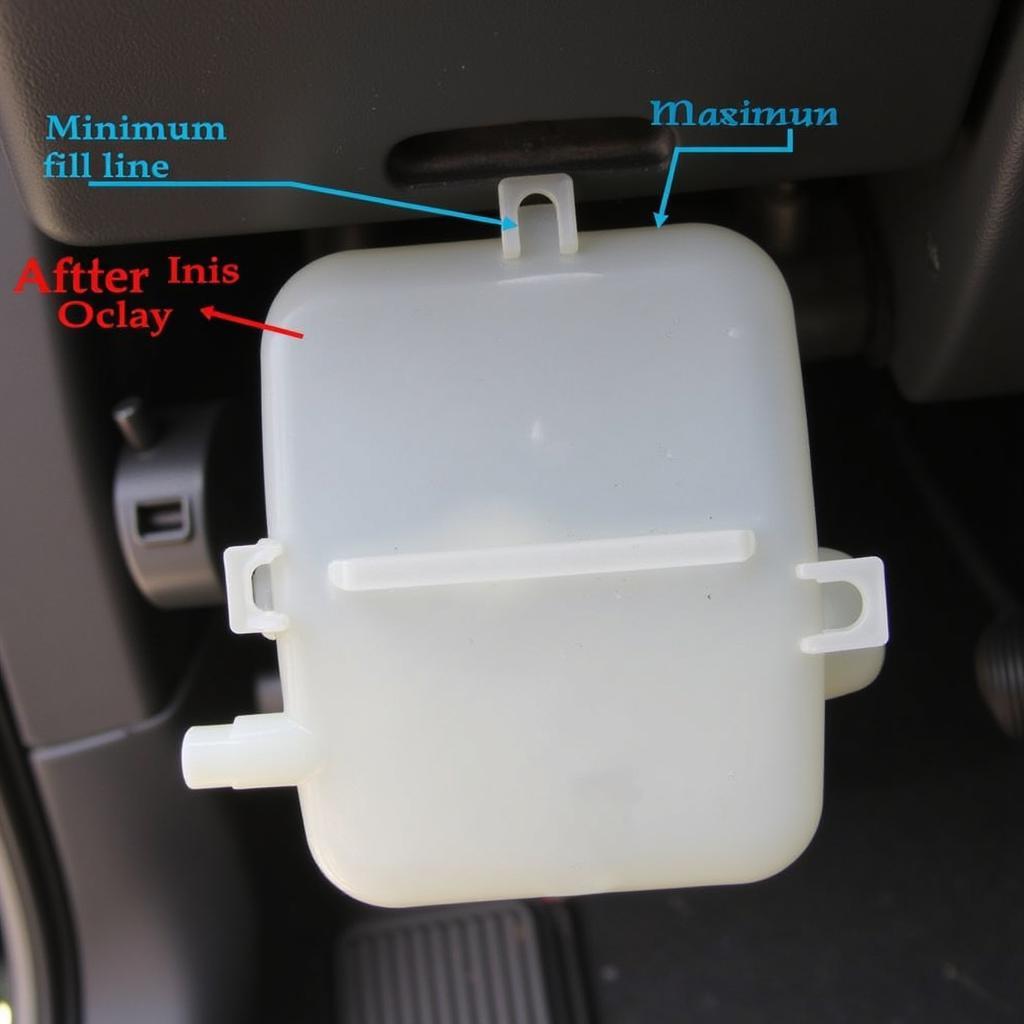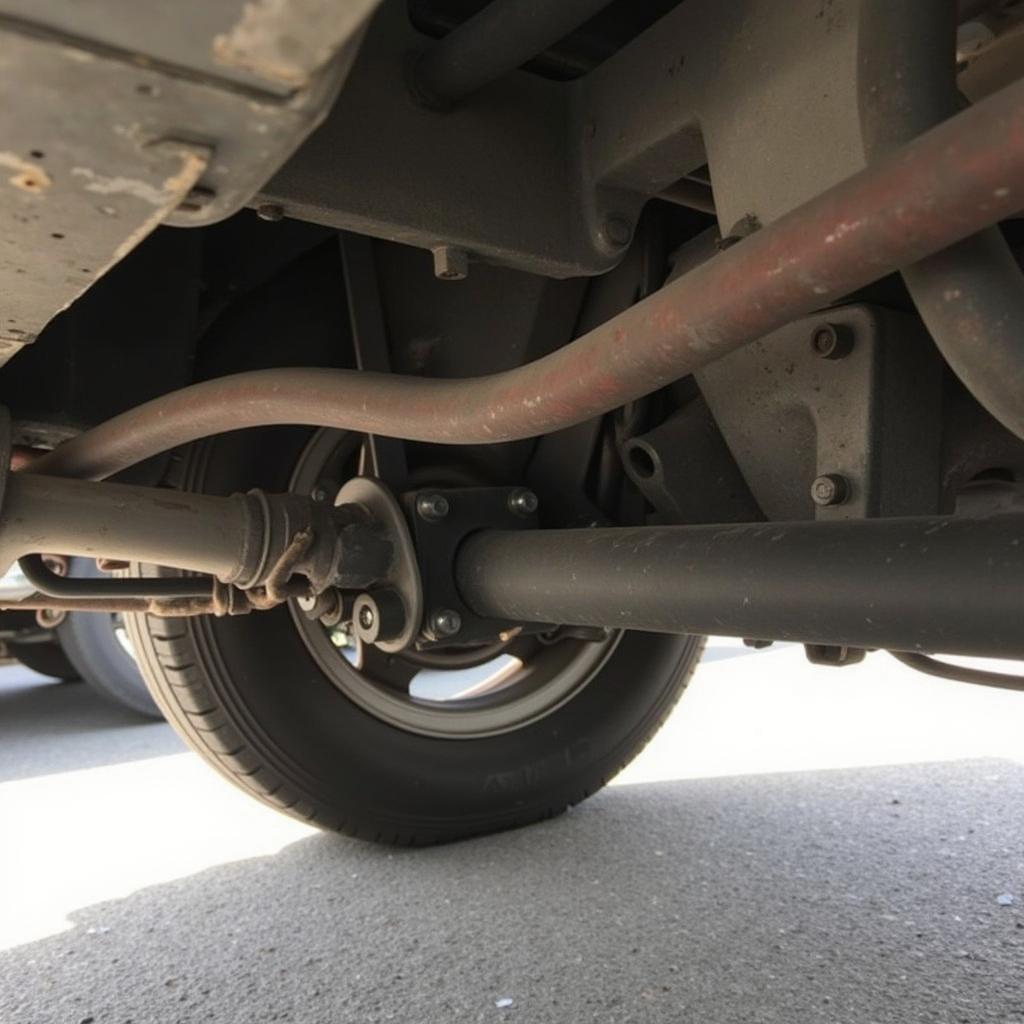The dreaded brake warning light on your 2006 Ford F150 can be a source of anxiety. Understanding why your 2006 Ford F150 brake warning light is on is crucial for your safety and the longevity of your truck. This article will guide you through common causes, diagnostic steps, and potential solutions, empowering you to address the issue effectively.
If you’re looking to upgrade your car’s audio system, consider a car radio with bluetooth and gps single din for a modern and convenient experience.
Common Causes of a 2006 Ford F150 Brake Warning Light
The brake warning light in your F150 can illuminate for several reasons, ranging from simple fixes to more complex issues. Here are some of the most frequent culprits:
- Low Brake Fluid: This is the most common cause. A leak in the brake lines, worn brake pads, or a failing master cylinder can deplete brake fluid.
- Worn Brake Pads: Brake pads have wear indicators that trigger the warning light when they reach a critical thickness.
- Faulty Brake Sensor: The sensor itself can malfunction, triggering the light even if the brake fluid level and pads are fine.
- Parking Brake Engaged: Sometimes the simplest explanation is the correct one. Ensure the parking brake is fully disengaged.
- ABS Issue: If the Anti-lock Braking System (ABS) has a problem, the brake warning light might illuminate along with the ABS light.
- Master Cylinder Problems: A failing master cylinder can cause a loss of brake pressure and illuminate the warning light.
 2006 Ford F150 Low Brake Fluid Level
2006 Ford F150 Low Brake Fluid Level
Diagnosing the Problem: A Step-by-Step Guide
Follow these steps to pinpoint the cause of your illuminated brake warning light:
-
Check the Parking Brake: Ensure the parking brake is fully released. This is the easiest fix and often overlooked.
-
Inspect Brake Fluid Level: Open the hood and locate the brake fluid reservoir. Check the fluid level. If it’s low, add brake fluid of the correct type, but be aware this is likely a symptom of a larger problem.
-
Examine Brake Pads: Visually inspect your brake pads through the wheel spokes. If they appear thin or worn, they likely need replacement.
-
Check for Leaks: Inspect the brake lines and around the master cylinder for any signs of fluid leaks. Look for wet spots or drips.
-
Scan for Codes: Using an OBD-II scanner, check for any diagnostic trouble codes (DTCs) related to the braking system. This can provide valuable insights into the problem.
How to Fix a 2006 Ford F150 Brake Warning Light
Once you’ve identified the cause, you can address the issue. Some fixes are simple DIY tasks, while others require professional assistance.
- Adding Brake Fluid: If the fluid is low, top it off. However, remember to address the underlying cause of the low fluid.
- Replacing Brake Pads: Worn brake pads need replacement. This is a relatively straightforward job that can be done at home with basic tools.
- Repairing Brake Leaks: Leaking brake lines are a serious safety concern and require immediate attention. A professional mechanic should repair or replace the damaged lines.
- Replacing Brake Sensors: Faulty sensors can be replaced. This is usually a simple job.
- Addressing ABS Issues: ABS problems require specialized diagnostic tools and expertise. It’s best to take your F150 to a qualified mechanic for ABS repairs.
- Repairing or Replacing the Master Cylinder: A failing master cylinder requires professional attention.
 Leaking Brake Line on a Ford F150
Leaking Brake Line on a Ford F150
If you’re looking to enhance your car audio experience, check out the alpine single-din bluetooth car stereo with hd radio for high-quality sound.
Why is My Brake Light Flashing?
A flashing brake light usually indicates a serious problem with the braking system, often related to low brake fluid or a malfunctioning ABS system.
What Should I Do if My Brake Warning Light Comes On While Driving?
If your brake warning light comes on while driving, pull over safely as soon as possible and assess the situation. Check your brake fluid and look for any visible leaks. If you’re unsure, call a tow truck. Driving with a compromised braking system is extremely dangerous.
You can compare different single din bluetooth android car radios comparison to find the perfect fit for your vehicle. Or if you just want the simplest option, consider the best single din bluetooth car radio for a straightforward upgrade. For the best reception, check out the best radio reception single din bluetooth car stereo.
Conclusion
Addressing the 2006 Ford F150 brake warning light promptly is crucial for ensuring your safety and the proper functioning of your vehicle. By understanding the potential causes and following the diagnostic steps outlined above, you can effectively troubleshoot the issue and take appropriate action. Remember, when in doubt, consult a qualified mechanic for professional assistance.
FAQ
- Can I drive my F150 with the brake warning light on? It’s highly discouraged. It indicates a potential problem with your brakes, and driving could be dangerous.
- How much does it cost to fix a brake warning light issue? The cost varies depending on the underlying cause. A simple fix like topping off brake fluid is inexpensive, while more complex repairs can be costly.
- How often should I check my brake fluid? Check your brake fluid level at least once a month as part of your regular vehicle maintenance.
- What type of brake fluid does a 2006 Ford F150 use? Consult your owner’s manual for the correct brake fluid type. Using the wrong type can damage your braking system.
- Can worn brake pads cause the brake warning light to come on? Yes, worn brake pads trigger the warning light through wear indicators.
- What does the ABS light mean? The ABS light indicates a problem with the Anti-lock Braking System.
- Can a bad brake sensor cause the brake warning light to stay on? Yes, a malfunctioning brake sensor can trigger the warning light even if there are no other brake issues.
